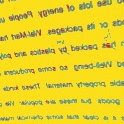Thank you, Tapped In
Tapped In was probably a victim of the sequester, whatever that was, where they cut off all those government funds for useful projects. I really have no idea, but I suspect it was started from a government grant that was designed to see if academics could use an online environment, like a campus, and enter it virtually, and talk to each other, and benefit from all being in the same virtual space.
I used to meet my friends there and chat on Sunday mornings about various educational technology topics, like how to make webcasts, or use skype in class, that kind of stuff. Generally my friends knew way more than I did, and lived in places like Abu Dhabi, Ottawa, or Argentina. That's what I liked about it; I could ask them, for example, who they thought would win the World Cup. Or how was the weather way out there? There was no shortage of topics. It was like being on an international flight.
One time, a couple of people entered a room we were in and started a lightning-fast conversation in a language totally foreign to me, except that it used English letters and an occasional English word. It was just understandable to arouse my curiosity, but I never figured out what they were doing. I went back and got a record of it, quick while I could (TI made transcripts available, but it was always hard for me to figure out how to get them). Someday this could be seen as the early days of online communication. These languages can probably use their own scripts now; people have other chatrooms, and have apparently found other venues.
A couple of times, I took my classes into TI, and insisted that we talk by chatting in its virtual rooms. They were a little confused about why I'd want to do this, but I told them, and it generally worked out all right. I was kind of a pioneer that way, in using chat in classes, but I didn't perfect the process so much as just try it out and see how I could use it. I still today think it would be useful, from a writing standpoint, to lure students into just producing, spontaneously and communicatively, lots of writing, but I haven't really followed through. Once a woman from Harvard came in and observed, and we explained to her what we were doing. My students would link to their papers (which were also online) in there, and people would then go read them. Another time some people just came and joined us and they were forced to talk about their papers a little. Various memorable things happened. It was like the train station in Manhattan; you would probably never be bored, as your next visitor could be from anywhere.
Except that, at some times, the workers and volunteers probably were bored. One problem was that it ran for 24 hours, but someone had to monitor it. This I'm sure wasn't always fun. I suppose you could set your computer so that you'd be warned about anyone's arrival, then go cook dinner, but it seemed to me it would be like graveyard shift at the parking garage, lots of waiting for maybe one person, sometimes. I'm really not sure how much traffic it had on a regular basis.
I was there, though. I loved it. Its landscaping was all virtual, but I made good friends there. To BJ, and Michael W., I hope I meet you in person someday. To the government grant agency, thank you for making it possible. For me at least, it did what it was intended to do.
Labels: chat, internet, writing
I looked forward to the TESOL Convention in Dallas this year, even though I had to arrive late and in fact couldn’t get there until this morning (Saturday). By chance I walked right into the plenary, rather than the main entrance, where I could register. I finally found the Electronic Village, where my friends of many years were doing their usual things, preparing for webcasts, finding cables, trying to make things work. I love the Electronic Village; though I am incompetent at such things, they’ve always accepted me as part of the CALL-IS and as a regular presenter. I gave my presentation, which was about the influence of grammar technology (translators, grammar checkers, etc.) on student writing and learning, I felt lucky to be part of TESOL and part of this group.
In fact the whole convention seemed lucky to me in the sense that I seemed to run into the people I needed to, even in such a short time. I went to presentations on writing, one about teaching writing using Jing movie software, and had coffee with materials writers who talked about the changing world of publishing. As usual we talked about conventions of past years. This is a group of friends that I see only once a year if I’m lucky, always in various cities, always with an interesting backdrop. Baltimore one year was raining cats and dogs. In Tampa I lost my wallet, but a hotel worker sent it back to me later. In New York one year it was snowing and very crowded in the hotels. My friends are consistent though. They know me and care about my family and my general well=being. These friendships cut through the years and is the most important thing abut the convention to me.
I think of TESOL as a large group of teachers, worldwide, who gather annually, share one city for part of one week, tell stories, meet old friends, do TESOL business. Some get wrapped up in IS politics; some measure what they can take home from the sessions in very practical terms. Some take taxis and some drive to town or walk everywhere. You can spot TESOL people in the hotels and the airport, not only by their bags, but also by their character, and also because I’ve seen some of them over the years. Every once in a while you see someone famous, like Stephen Krashen, or Betty Azar. I know the organization is not perfect and has had its ups and downs. But as I look back over the years I’m still proud to be part of it, and my luck is holding up. It’s been good to me.
I’m a Texan now; I moved to Lubbock in August and have been learning about the place as fast as I can. Texas is a place with its own music, a sense of national pride (even though it’s just a state), and wild weather. People are very friendly. I’ve been welcoming my friends here now, as a Texan. I was walking through Dallas with one friend, because we wanted to see the infamous grassy knoll; we encountered a nice old policeman with a West Texas drawl, and a kind of guide at the knoll who explained that piece of Texas history, showed us what happened and where. Dallas seemed peaceful, even though that spot itself was somewhat busy with traffic. If the ghosts of the past are still with us, then Kennedy’s would be right at that spot, I imagine. In the same way, I feel the ghosts of old TESOLs. But they have to move around, from city to city.
Labels: personal, tesol
Doing Dallas
I'm getting excited about the upcoming TESOL convention in Dallas, TX so I'm reviewing all my old stereotypes of the city so I can look around and get some idea of how they compare to reality, while I'm there. There's really only one thing I want to see - the grassy knoll - but I know that the city has a wide variety; I'll only be there for a couple of days, so I'll forgive myself if I don't get out to see it all.
Recently I relocated to Lubbock, TX, so I find myself flying into Dallas frequently, and I'm rapidly learning more about the place. It's huge, when you come at it from above; the plane cruises in over miles and miles of lakes, roads, houses, people, buildings. It stretches all the way to Oklahoma in the north, Waco to the south, and to the west is Fort Worth and yet more suburbs so that it stretches perhaps farthest to the west. They call it the Metroplex here, and generally people are more fond of Fort Worth than Dallas, but you practically can't get anywhere east, without going through it, and that's like all driving in Texas, it takes a while, might as well enjoy it.
When they made that television show I think the idea was to associate the name "Dallas" with ostentatious, arrogant wealth, the kind that makes ordinary people gloat when bad things come to very rich people. I can tell you that it would be hard to have a town as enormous as Dallas
not have a good share of that kind of wealth, but I'm also sure that there's a lot more to the place, it being as huge as it is. My favorite story about the place is of the Fort Worth newspaper owner, a millionaire himself, who, when going to Dallas, always packed a sack lunch, because he didn't want to contribute to the city's economy. So there's no question that its bustling attitude has produced a few enemies over the years. I'd like to see what this means on a practical level; to some degree, it's the capital of the Texas empire, though I suppose a lot of the oilmen, like the Bushes, called Houston home. And Houston to some degree is even worse, at least in terms of "sprawling" or "bustling" or "ostentatious." It's hard for me to even get a handle on the place.
It's kind of like California in the sense that, at first, you think San Francisco is just a big city, maybe number 18 in the nation, you can handle that, it's not too huge. But you get out there and find out, it's surrounded by dozens more, and some of them like Oakland and San Jose are also right up there, and it takes you hours to drive through the place, and pretty soon you're taking a huge breath when you finally do make it out of the place. Dallas is the same. Fort Worth is also enormous; though Lubbock is in the top hundred in the nation, it's not even in the top ten of Texas, and there are at least three or four in the Metroplex alone that are larger.
One thing I like about the place, though, is that it's developed its own brand of music. Austin is in on this, if not the center of it, but so-called 'red-dirt' encompasses all kinds of Texas music, mostly country, and it's got its own style, a kind of authentic country very distinct from Nashville country, earthy, unapologetic. Its artists are original and many live in Dallas or Austin, and play the circuit, and have plenty of work. Whole radio stations are devoted to
"red dirt"...and there's enough of it that these stations don't have to play anything else. Right now, as the world comes to Austin for the famous SXSW (South by Southwest) festival, I'm sure people are hearing plenty of it, though I'm new to the area, and am not totally familiar even with SXSW. Last I noticed, it had added an educational-technology aspect to its conference, so that people even as I write are listening to talks on the state of the art in ed-tech and tech in general; this I'm sure is to help Austin develop its computer industry (it claims to be the main competitor to the Silicon Valley in innovation and tech developments). SXSW started out as merely a music festival, only a few days; now it's music, film, and computer, and more I'm sure, and it's well over nine days. And these people, they invite everyone down to sunny Austin, which I'm sure is nice in mid-March, and they check out computer innovations and then go straight out to Austin, where it's like that other show, Austin City Limits, all night every night, and they have a grand old time. You can't argue with that.
I'm not sure if Dallas will have much red-dirt, or a night life anywhere comparable to Austin's; I'm not much of a night-lifer anyway, though I'm kind of taken by this red-dirt stuff. It's my adopted state, so my perspective has changed, and now I'm thinking of tipping a cowboy hat, and saying Howdy y'all, welcome to Texas!
Labels: personal, tesol
War on passives
This year for the first time I am teaching international students and American students simultaneously. One difference is that internationals generally know what the passive is. The passive is a way of saying something (like
I am involved in intramural sports or
I have been struck by the incongruity of this situation) where the verb has a
be in it more or less beside the past participle, and the victim of the action now lies in the subject position. It is very useful in sentences like
2000 were killed in an earthquake or
employees were informed of the layoffs when the bad guy is horrible or doesn't want overt recognition; one could argue that simply emphasizing the victim, by putting him/her/them in the subject position, one is not necessarily hiding the perpetrator so much as de-emphasizing, but, passive takes the rap for being used by those sneaky perps to cover up their actions.
The lamp is broken is one sentence I used to use in order to teach it; the child learns this as part of his/her increasing sophistication with the language, thus learning how not to admit to one's crimes.
So in the sixties, or thereabouts, social science writers in particular led the charge to iron out all
it was observed that... constructions, in science reports, and just own up to who did it, as in
we observed that.... Where this turned into a tidal wave of denigration of the passive, I'm not sure. Today in English classes throughout the land, graduate assistants are using "eliminate the passive" as code for "make your writing as powerful, assertive, and direct as possible." This is in general good advice. Saying "We observed..." is more assertive than saying "it was observed" and leaving it to the reader to figure out who did it. For writers to systematically weed out these constructions may be unrealistic though. One big problem is that by and large they don't know what they're doing.
I'll start with the internationals. The machines, namely grammar-check, have taken to telling them that it's wrong, and advising them to use active sentences. Thus we see a lot more "I involve in that." The more sophisticated machines can tell them that it's "Intramural sports involve me" but that also is awkward, and it removes the flow of an essay that focuses, for example, on what they have been doing this semester. There are many words, like
involve, that need passive in order to be used properly or smoothly. But internationals don't know this from the advice the computer gives them. In the last few years I began noticing, as I taught passive, a quizzical look on internationals' faces, as if to say, is this real? Can you do this? (if not, why does my computer keep saying you can't?)...Are you serious?
Internationals, at least, can see the reasoning, and the history, of the war. Steeped in grammar, they can see why you'd use it, why you'd reject it, why it might be necessary sometimes, and why the computer can't tell when it's necessary and when it's not. They get disgusted by the whole mess, but grammar is like that anyway, and they've been studying TOEFL, for example, weeding out exceptions and irregularities; they've become expert on these things, and have picked up some speed in building the background knowledge necessary to process it.
Americans are another story. The GA's in freshman English classes themselves don't always know the passive, and mark sentences like
This is appropriate and
That is exorbitant as passive, when they're not. The war on passives is extended to all
be verbs and comes to be somewhat like the war on terror: A huge outlay of time and effort for an unknown enemy. Freshmen writers are even more clueless; they often don't know when they've used it, what it looks like, how to make it active. Sometimes the teacher doesn't give them the guidance. Truly getting caught in a grammar dispute makes the grad assistants quite uncomfortable, so they tend to stick to higher ground, the content, or analysis of a work, and leave the grammar for the red pen to make a single mark on it, often indecipherable, or vaguely criticized.
Maybe the last thing I'd like to do, a dream I've had for some time, is to make a little book that explains this in simple words, and helps these poor students understand what the grad assistant is saying. You can't do much about grad assistants who abuse their power, or who don't know what they're talking about, or whatever; they could use a book like this too, of course. I could put lots of things in it, like why it's considered a dilemma when writers say, "The student brought their book;" it's surprising to me how many of them
don't even see the problem. It's one thing to make an informed choice, to go against the grain, or do what's easiest and take the rap. What amazes me is the perpetuation of cluelessness, as if mentioning that passives are not as direct or assertive as actives, will actually change people's language. Maybe it would, for the one or two percent of us, but, we weren't really the primary audience.
Labels: grammar, writing
The vodka is good, but the meat is rotten (part 2)
When you translated, by machine, from English to Russian, "the spirit is willing, but the flesh is weak," then, turn around and translate the same expression back into English, you would get "the vodka is good, but the meat is rotten." This was used for many years to demonstrate that machine translation would never pick up the nuances of metaphorical meaning.
Metaphorical meaning is in fact a hard part of machine translation, but perhaps not as hard as you would imagine. It is not impossible, for example, to notice that
most of the time, when the four words the+spirit+is+weak appear together, there is generally a metaphorical meaning. It is not impossible to identify that meaning. It is not impossible to get the computer to just deliver the metaphorical meaning upon command.
A whole supply of metaphoric expressions work this way; for example, "off the hook", "up the creek without a paddle," or "at loggerheads with each other". The computer looks foolish if it tries to translate one word at a time; you might lose that metaphoric meaning altogether. It becomes humorous to try to find metaphors in the jumbled productions that machine translate gives you. Songs, which are full of metaphor, are the worst; try crunching a few of them through a machine translator.
So this brings to mind several process that inevitably follow from this weakness. First, somebody has to go through the language, word for word, expression by expression, and make it so the computer can identify metaphoric ones with reasonable accuracy. Some, for example the one with the creek and the paddle, appear in pieces, or with different word combinations. Some, such as "off the hook" could have been written, originally, in absolute seriousness, with no metaphoric meaning whatsoever. The machine has a problem here, which is to make a statistical guess at the likelihood that you have a metaphoric meaning. But fortunately, machines are good at statistical guesses. A concordancer can give you the last 1000 times anyone used "at loggerheads with each other" and tell you with certainty how many of these actually had to do with sea turtles. Of course, the best metaphors are suggestive, and mean only what they say, but suggest other things, or don't, depending on the feeling of the writer. You could accuse me, for example, of making the title of this post metaphoric. And I could deny it. How is the computer supposed to know if I, the writer, don't know? Or lie?
So, there are times that the best the computer can do is point out that
this is often used metaphorically or
this could be metaphoric. Let the reader decide. Give the reader the whole picture. That's called good, careful reading; getting the whole picture, and deciding yourself. By the way there is another phenomenon that I should point out. Businessmen who use Google Translate, for example, for every trade, get out of the habit of using metaphors. In effect they say, "Well, I would use 'off the hook,' but the computer will butcher that (so to speak), so I'll just say, it's not your responsibility". And so their
language and style actually change to fit the medium. Computer-translated language becomes less metaphoric naturally and by necessity.
But back to the main point, which is that what appeared to be a fairly inviolable line (computers will
never be able to think metaphorically) turns out to be quite fluid, easy to beat, left behind (in the better programs) in a trail of dust. The better programs are flagging metaphoric expressions and identifying them as such. These programs have other problems, some of which impede meaning, but that isn't one of them.
It brings up the question of what happens when language learners stumble upon these machines, and use them in the process of learning. It's the
teachers, by the way, who have trouble recognizing when a given body of jumbled up text has been created, essentially, by a computer dealing either with a student's original work or some other body of writing. Generally nobody has told the student that this is wrong, illegal, or whatever. Generally the teacher looks at the high-level vocabulary (translated directly from native words), the jumbled-up word order, metaphoric gaps, etc., and gets angry. How could a person of such limited awareness (of sentence structure) use such big words? Or, how can I possibly unravel this to figure out what you
mean? Once I had a student who, asked to produce an English newspaper article, produced one that had run through the machine from Chinese. I looked at it and knew instantly that it was not standard English. But he genuinely didn't see the problem. One article full of English looked pretty much like the other to him: incomprehensible. He generally produced work similar to what is mentioned above, and he had flunked more than once up to that point, probably having made some teachers quite angry. It was his problem that he was at the cutting edge of the new technology.
I would call these learners
false positives in the sense that they show great sophistication in areas where they really don't have the skill. The skill of turning high-level words into computer-generated glosses is a computer skill; often they have that skill, but not the one where you look at a simply misformed sentence and
know it's wrong. And sometimes they'll slip each piece through several machines, hoping that more translation can only improve it. Start with google translate, then go through Ginger or Grammarly, and see where you end up. Teachers, unfortunately, are generally too busy to foresee what could have happened, or why they have a student with a paper that he or she can't even read. To the teacher it smacks of plagiarism, cheating, paper-buying. But it's not. The computer is like the purple pen, the fancy paper or the pretty font. It's part of the environment, and it's not labeled with a sign that says, "this tool will discourage your language learning" until we label it that way and actually prohibit it. But even then, even the
phones are picking up skills. Why can't we just tell the phones what the problem is?
Labels: google translate, internet, writing
The vodka is good, but the meat is rotten
The title comes from an old joke, based on reality, that a computer could translate words directly, such as "the spirit is willing but the flesh is weak", an old Biblical phrase, but, crunching it through the machine into several languages would amount to disaster, as in this case, where the saying was crunched into Russian and then back again, yielding a quite different phrase, but one which I like nevertheless.
For hundreds of years people have rested comfortably with the idea that computers can translate words directly, but will always do a poor job with suggested meanings, or metaphoric meanings, as is the case above. These people aren't fully aware of the resources at computers' disposal. These days Google Translate (GT) is at the forefront of natural language processing, and this is interesting, because Google at least has enormous resources to provide that help to change the equation. I'm not suggesting that NLP has become perfect, but rather that it's on a steady progression (approaching 1, we could say) upward, and with each step closer to being able to accurately translate a phrase such as the above, there are adjustments we out here will have to make to that capability.
Right off the bat, a person with a sharp eye could spot that any phrase containing this string: "the spirit is willing but the flesh is weak" is probably the common one that we recognize, and has a metaphorical meaning rather than a specific interpretation involving someone's flesh. That person could simply program into any translation program the meaning of such a string. The machine translator could furthermore warn the writer that 99% of the time people use this expression with a certain metaphorical meaning, but it's not out of the realm of possibility that they are referring to specific flesh. This is in fact how we hear such things. We keep track of the averages and try to keep an open mind to the more literal possibilities.
Thus Google Translate becomes closer and closer to being like us, and calculating the probable meanings of expressions in every language including ours. We laugh at the computer's inability to detect sarcasm, metaphor, shades of meaning, etc. We underestimate the vast pools of data that GT technicians can bumble through. We underestimate the fact that, as one of the biggest viable companies in the world, Google can simply ask its employees, "what does this phrase mean to you?" and run with its answer. In fact, it has considerably more resources than simply the ability to translate each word directly into another language. More on this later.
Labels: google translate


















































